WebInfo
| Logo | Name and Description |
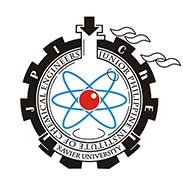 | Junior Philippine Institute of Chemical Engineers (JPIChE)Is an organization that seeks to help augment the current academic standing of chemical engineering students through seminars, forums, and plant tours. This organization also aims to incorporate the Ignatian values in the chemical engineering students through participating not just n school activities, but also in social outreach activities. |
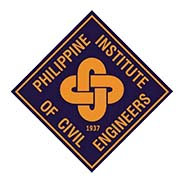 | Philippine Institute of Civil Engineers (PICE)Is a fun- loving organization established to create a fun environment for C.E. students. It is where camaraderie is being taught and Ignatian values are being imprinted to the future engineers. This is where builders for the future are being built! |
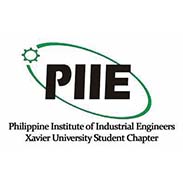 | Philippine Institute of Industrial Engineers (PIIE)Is a co-curricular organization of Xavier University for students taking up Industrial Engineering. This organization aims to mold and equip IE students through its programs and activities to a holistic formation to be a man and woman for others. PIIE-XUSC serves as a training ground for students that will expose them to the different specialization of Industrial Engineering. |
 | Junior Philippine Society of Mechanical Engineers (JPSME)Is a co-curricular organization of Xavier University for students taking up Mechanical Engineering. This organization aims to mold and equip ME students through its programs and activities to a holistic formation to be a man and woman for others integrating also the skills, knowledge and values learned as ME students. |
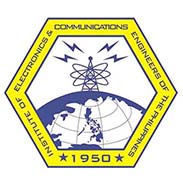 | Junior Institute of Electronics Engineers of the Philippines (JIECEP)Is a global paradigm organization of competent, agile, virtuous and committed Electronics Engineering students. It is a specialized organization created for the academic development of the art of electronics and communications. It operates with the belief that students of the said field should be academically inclined and practically involved in activities related to electronics & communications engineering. The goals of JIECEP involve promoting unity among Electronics Engineering students of Xavier University, helping the ECE students realize the importance and capabilities of Electronics Engineers, and initiating and organizing different activities that will enable the officers, members, and other Electronics and Communications Engineering students to develop more their skills, to become a better individual, and to widen their horizons about their understanding in the course. |
 | Institute of Integrated Electrical Engineers of the Philippines, Inc. (IIEE)Is a student organization of all Electrical Engineering student of Xavier University. The organization’s vision is to develop the initiative of EE students to be aware of the greater responsibilities that await us not only in excelling in the academic field, technical skills and competence but also in providing ourselves with the humanistic foundation that will train and develop in us a social conscience. It aims to:
|
Chemical Engineering is a field that is concerned with the design, development, operation and management of industrial processes in which materials are transformed by chemical reaction and/or physical means.
The Chemical Engineering curriculum provides a challenging academic and research environment for learning the concepts of unit processes operations. These includes conceptualization, development, design, improvement and application of safe, healthy, ethical, economic and environmentally-sound ways of utilizing materials and energy. The program offers broad and rigorous lectures and laboratory instructions on the fundamentals of chemical engineering, and subject as diverse as the flow of gases, liquids, and particulate solid, physical phenomena such as heat transfer, mass transfer and molecular diffusion, and physical methods such as distillation, absorption, evaporation, drying and filtration.
The lectures and instructions are primarily designed to develop the student’s ability to analyze, invent, innovate and apply chemical processes and products. Considered equally important in the program is the development of the student’s independence, resourcefulness, creativity, discipline and professional ethics in the appreciation of the societal impact of chemical engineering and the value of continuing growth.
Accreditation: PAASCU Level II, COD
Program Educational Objectives
The XU Chemical Engineering (XU ChE) graduates, formed and trained through Jesuit liberal education are deeply rooted in the Catholic faith and are persons of competence, conscience, and commitment. Thus, consistent with these goals, the XUChE program is geared towards producing graduates, who, within three to five years from graduation, have:
- (Competence) Become competent ChE professionals, who are proficient in the application of their knowledge and skills in basic sciences and engineering principles in the design, innovation, improvement, supervision and management of chemical engineering processes and systems in the presence of practical constraints to solve real-world technical problems.
- (Competence) Manifested professional growth and career advancement through satisfactory progress towards positions of higher responsibility, completion of an advanced degree, or by successful transition from the "traditional" chemical engineering career path into the allied fields of business, government, academe, etc.
- (Competence, Conscience, Commitment) Worked as effective, conscientious and committed team members or leaders who embody ethical and professional excellence rooted in Jesuit liberal education and Christian humanism. They have equipped with excellent communication and people skills and are actively participating in their community, church and professional organizations.
- (Competence, Conscience, Commitment) Become significant contributors to society by creating chemical engineering designs and solutions that are safe and sustainable. Being men and women for others, the XU ChE graduates discern, decide and do what is right and strive for truth and will seek to support others, especially in the context of widespread poverty in the country.
- (Competence, Commitment) Embraced an active life-long purpose of advancing their expertise by continuing professional education, attaining advanced degrees or furthering research activities that tackle on critical areas of the chemical engineering field.
Program Outcomes
The graduates of the XUChE program shall demonstrate the following:
- Ability to apply knowledge of mathematics, physical sciences, biotechnology and engineering sciences to solve chemical engineering problems.
- Ability to design and conduct experiments to test hypothesis and verify assumptions, as well as analyze and interpret data and to simulate processes.
- Ability to design, improve, innovate and supervise a system, process or component to meet desired needs within realistic constraints.
- Ability to work effectively, responsibly and committedly in multi-disciplinary and multi-cultural teams.
- Ability to identify, formulate and solve chemical engineering problems.
- Understanding of the effects and impact of the chemical engineering profession on the environment and the society, as well as the social and ethical responsibilities of the profession in accordance to Christian and Ignatian precepts.
- Specialized knowledge in at least one field of chemical engineering practice.
- Ability to read, write and speak effectively in English and a local language; and to utilize modern means of communication.
- Recognition of the need for, and an ability to engage in lifelong learning and to keep current of the development in a specific field of specialization.
- Ability to apply appropriate techniques, skills and modern engineering tools necessary for chemical engineering practice.
- Knowledge of contemporary issues.
- Knowledge and understanding of engineering, business, public policy, leadership and management principles as team member or leader to manage projects in multidisciplinary environments and various fields of practice.
- The ability to preserve and promote Filipino historical and cultural heritage.
In compliance with the Commission of Higher Education (CHED) Memorandum Order No. 37 series of 2012, the College of Engineering adopts the Outcomes-Based Education (OBE) system in its academic program implementation.
OBE Implementation Framework
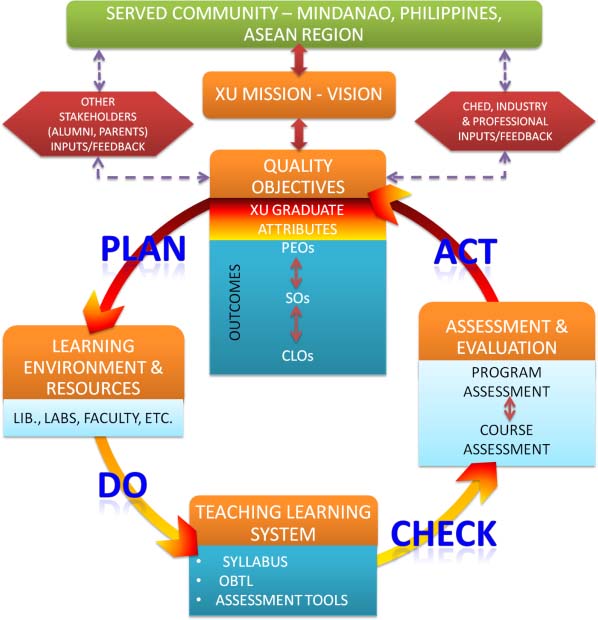
Figure 1. College of Engineering OBE implementation framework.
The framework basically includes the following components:
A. XU Mission and Vision
B. Program Educational Outcomes (PEOs)
C. Student/Program Outcomes (SOs or POs)
D. Curriculum Mapping showing correspondence of courses with SOs
E. Outcomes-Based Teaching and Learning (OBTL) Delivery Process
F. Program Assessment and Evaluation Process
G. Continuing Quality Improvement Program
Our OBE framework anchors on XU’s noble purpose to form leaders of character (embodying the core values of competence, conscience and commitment). Together with the various needs and inputs from the served community, these serve as the bases of XU graduate profile and from it we articulated the Program Educational Objectives (PEOs) and Program Outcomes (POs) for each of the engineering programs.
As an education philosophy, OBE offers stronger focus on student-centered learning and program outcomes which are constructively aligned to our mission and vision statements. The importance of traditional program inputs such as faculty and faculty development, libraries, laboratory equipment, lectures, etc. are recognized and not ignored; more focus is on how these inputs are utilized so that graduates meet an internationally acceptable level of knowledge, skills, and attitude demanded by the different fields of engineering practice. Furthermore, the OBE framework necessitates that every component in our OBE system is supported by a continuous quality improvement program where our existing quality assurance processes are integrated.
Civil Engineering is an engineering field that deals with planning, analysis, design and construction of structures such as bridges, building, dams, airports, ports and harbors, highway, tunnels, tower and water distribution systems. The profession has expanded to embrace new concepts on urban and environmental planning, sustainable development and new technologies in line with environmental protection, restoration of degraded landscapes and conversation of historic structures. Emphasis is given to the economic, efficient and sustainable use of natural resources and built environment.
Accreditation: PAASCU Level II, COD
Program Educational Objectives
The XU Civil Engineering (XU CE) graduates, formed and trained through Jesuit liberal education are deeply rooted in the Catholic faith and are persons of competence, conscience, and commitment. Thus, consistent with these goals, the XU CE program is geared towards producing graduates, who, within three to five years from graduation, have:
- (Competence) Become competent and engaged civil engineering professionals who are proficient in the application of their knowledge and skills in the design, construction, maintenance and management of reliable infrastructures and/or technical activities in support of civil engineering projects.
- (Competence) Manifested professional growth and career advancement through satisfactory progress towards positions of higher responsibility, completion of an advanced degree, or by successful transition into the allied fields of business, government, academe, etc.
- (Competence, Conscience, Commitment) Worked as effective, conscientious and committed team members or leaders who embody ethical and professional excellence rooted in Jesuit liberal education and Christian humanism. They have equipped with excellent communication and people skills and are actively participating in their community, church and professional organizations.
- (Competence, Conscience, Commitment) Become significant contributors to society by creating civil engineering designs and solutions that are safe and sustainable. Being men and women for others, the XU CE graduates discern, decide and do what is right and strive for truth and will seek to support others, especially in the context of widespread poverty in the country.
- (Competence, Commitment) Will pursue an active life-long purpose of advancing their professional expertise, either by attaining advanced degrees in engineering or furthering research activities that tackle on critical areas of civil engineering field.
Program Outcomes
The graduates of the XUCE program shall demonstrate the following:
- The ability to apply their knowledge of the fundamentals in mathematics, physical and engineering sciences to solve civil engineering problems.
- The ability to design and conduct civil engineering experiments, as well as to analyze and interpret data.
- The ability to design, build, improve, and install systems or processes in structural design, geotechnics, hydraulics and water resource engineering, transportation engineering, highway engineering, environmental science, and construction technology and management in order to meet desired needs within realistic constraints such as economic, environmental, social, political, ethical and sustainability.
- The ability to work effectively, responsibly and committedly in multi-disciplinary and multi-cultural teams
- The ability to recognize, formulate and solve civil engineering problems.
- The broad education necessary for the understanding of the effects and impacts of civil engineering projects on nature and society, and of the civil engineers’ social and ethical responsibilities in accordance to Christian and Ignatian precepts.
- The specialized knowledge in at least one field of civil engineering practice;
- The ability to read, write and speak effectively in English and a local language; and to utilize modern means of communication.
- Recognition of the need for, and an ability to engage in lifelong learning and to keep current of the development in a specific field of specialization.
- The ability to apply the appropriate skills, techniques and modern engineering tools necessary for the practice of civil engineering.
- Knowledge of contemporary issues.
- Knowledge and understanding of engineering, business, public policy, leadership and management principles as team member or leader to manage projects in multidisciplinary environments and various fields of practice, including the community and the church.
- The ability to preserve and promote Filipino historical and cultural heritage.
Vision
The College of Engineering shall be a center of excellence for engineering education, research, and social development in the Asia Pacific region.
The graduates of the College shall be engineers with Christian precepts who are globally competent leaders.
Mission
The College of Engineering is a dynamic learning community committed to the growth of society in the areas of energy and environmental management, techno-preneurship, agro- industrial processes and urban - rural development. It embodies XU’s basic thrust of forming persons for others.
As an academic institution, the College responds to the human resources needs of the region by producing quality graduates with appropriate knowledge of, skills in, and attitude for engineering and technology in the fields of chemical, civil, electrical, and mechanical industrial and electronics engineering.
As a resource center, the College spearheads industrialization by providing pool of experts and facilities. It actively collaborates with institutions for technological advancement. It pursues topnotch researches and innovation opportunities in next-generation technologies, services, and businesses. It serves as a venue for dialogues on the application and social impact of technology.
As an organization, the College is committed to the continuing development of its personnel and programs


































